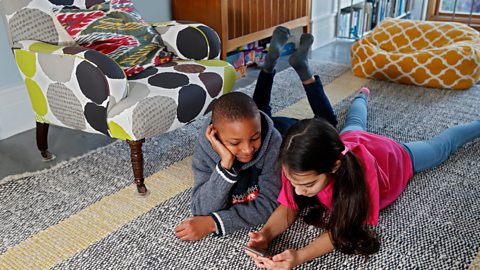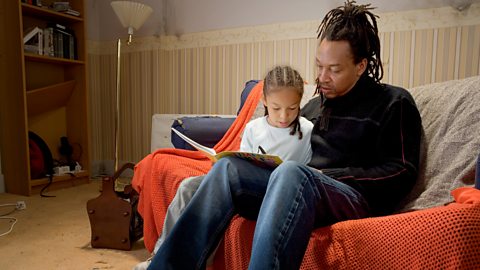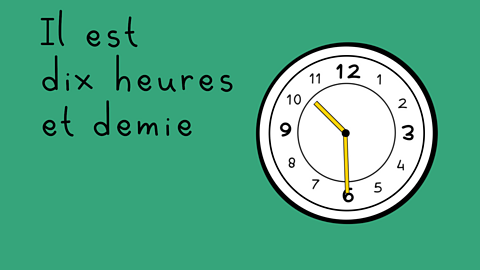Talking about your family and pets in French
Qui est dans ta famille? - Who is in your family?‎
Alors ma famille et moi.
Dans ma famille il y a ma mère et mon père et ma soeur - In my family there is my mother, my father and my sister. ‎
When you say my in French you use ma for feminine nouns such as ma ‎mère and mon for masculine nouns like mon père.‎
And to talk about who you live with… ‎
J’habite avec ma mère et mon beau-père - I live with my mum and my ‎step-father.‎
And what about pets? Bien sûr! J'ai un chat - mais je n'ai pas de chien - I have ‎a cat but I don’t have a dog.‎
So with these words you can start to talk about your own family and pets.‎
To talk about family members, use a form of avoir (see the table below) followed by un (for male ‎family members) or une (for female ones) and then the family member.
If you have ‎more than one, say the number and then make sure you use the plural.‎
| to have | avoir |
|---|---|
| I have | j'ai |
| you have | tu as |
| he has | il a |
| she has | elle a |

With half brothers and sisters and also stepbrothers and stepsisters, use demi for ‎both male and female.‎

- J’ai un frère - I have a brother.‎
- Tu as une sœur ? - Do you have a sister?‎
- Il a trois demi-frères - He has three half-brothers.‎
- Elle a un demi-frère et deux sœurs - She has a stepbrother and two sisters.‎
You can also say dans ma famille, il y a (in my family, there is/are) with mon for ‎masculine family members, ma for feminine ones, and mes for plural.‎
- Dans ma famille, il y a mon père, ma sœur et mes trois frères - In my family, there ‎is my dad, my sister and my three brothers.‎

| French | English |
|---|---|
| un pГЁre | a dad |
| une mГЁre | a mum |
| un frГЁre | a brother |
| une sœur ‎ | a sister |
| un demi-frГЁre | a half-brother or step-brother |
| une demi-sœur ‎ | a half-sister or step-sister |
| un beau-pГЁre / une belle-mГЁre | a step-father / step-mother |
| une famille d’accueil | a foster family |
| des parents adoptifs | foster / adoptive parents |
Describing your extended family
To talk about your relatives, such as aunts, uncles, cousins and grandparents, you can use ‎the following words:‎
| French | English |
|---|---|
| un grand-pГЁre | grandfather |
| un oncle | uncle |
| un cousin | male cousin |
| une grand-mГЁre | grandmother |
| une tante | aunt |
| une cousine | female cousin |
| des grands-parents | grandparents |
| des cousins | cousins (male and female)‎ |
You could describe your extended family in a paragraph as follows:‎
J’ai une très grande famille !‎
Il y a mon père et ma mère, mes deux sœurs et moi.‎
J’ai aussi huit cousins, trois tantes et quatre oncles.
De plus, Вб’aѕ± trois grands-parents - un grand-pГЁre et deux grands-mГЁres.
Translation:
I have a very big family!‎
There is my dad and my mum, my two sisters and me.
Also, I have eight cousins, three aunts and four uncles.
In addition, I have three grandparents - one grandfather and two grandmothers.‎

Talking about family relationships
To talk about relationships with family members, use je m’entends bien avec (I get on ‎well with), or je ne m’entends pas bien avec (I don’t get on well with) followed by the ‎family member(s).‎
- Je m’entends bien avec mes parents - I get on well with my parents.‎
- Je ne m’entends pas bien avec mon frère - I don’t get on well with my brother.‎
To give reasons why you (don’t) get on with someone, use parce que (because) and a ‎reason. This is often an adjective, and the adjective changes depending on whether the ‎people are masculine, feminine or plural.‎
- Je m’entends bien avec mon frère parce qu’il est amusant - I get on well with my ‎brother because he is funny.‎
- Je m’entends bien avec ma sœur parce qu’elle est amusant_e_ - I get on well with ‎my sister because she is funny.‎
- Je m’entends bien avec mes cousins parce qu’ils sont amusant_s_ - I get on well with ‎my cousins because they are funny.‎
- Je m’entends bien avec mes tantes parce qu’elles sont amusant_es_ - I get on well ‎with my aunts because they are funny.‎

Describing your pets
To talk about your pets, you can use Вб’aѕ± (I have) to say what pet you have, or je voudrais ‎‎(I would like) to say what pet you’d like to have.‎
To ask someone if they have a pet, you can say:‎
- Tu as un animal ? - Do you have a pet?‎
To reply, you could use one of the following sentences:‎
- J’ai un chat - I have a cat.‎
- Je voudrais un poisson rouge - I would like a goldfish.‎
- Je n’ai pas de chien - I don’t have a dog.‎
- Je n’ai pas d’animal - I don’t have a pet.‎
Here are some more pets in French:‎
| French | English |
|---|---|
| un chat | cat |
| un chien | dog |
| un serpent | snake |
| un lapin | rabbit |
| un cheval | horse |
| un cochon d’Inde | guinea pig |
| un hamster | hamster |
| un poisson rouge | goldfish |
| un perroquet ‎ | parrot |
| une souris | mouse |
| une araignГ©e | spider |
| une tortue | tortoise |
To describe your pet, you need to use mon for masculine animals, ma for feminine ‎animals and mes for plural animals. Then you need a form of ГЄіЩ°щ±р (to be), followed by an ‎adjective, which changes depending on whether the pet is masculine, feminine or plural.‎
- Mon chien est grand - My dog is big.‎
- Ma tortue est grand_e_ - My tortoise is big.‎
- Mes serpents sont grand_s_ - My snakes are big.‎
- Mes araignées ne sont pas grand_es_ - My spiders are not big.‎
Here are some useful adjectives you could use to describe your pets:‎
| French | English |
|---|---|
| Іµ°щІ№ІФ»е(±р)‎ | big |
| petit(e) | small |
| amusant(e)‎ | funny |
| mignon(ne) | cute |
| sympa / affectueux / affectueuse | friendly |
| ennuyeux / ennuyeuse | boring |
| paresseux / paresseuse | lazy |
| intelligent(e)‎ | intelligent |
| bruyant(e) | noisy |
Quiz
Find out how much you know about family and pets in French in this short quiz.

Game - FestiLingo: French. game
Visit the festival and practise French language skills in this game

More on Topics
Find out more by working through a topic
- count4 of 9

- count5 of 9
